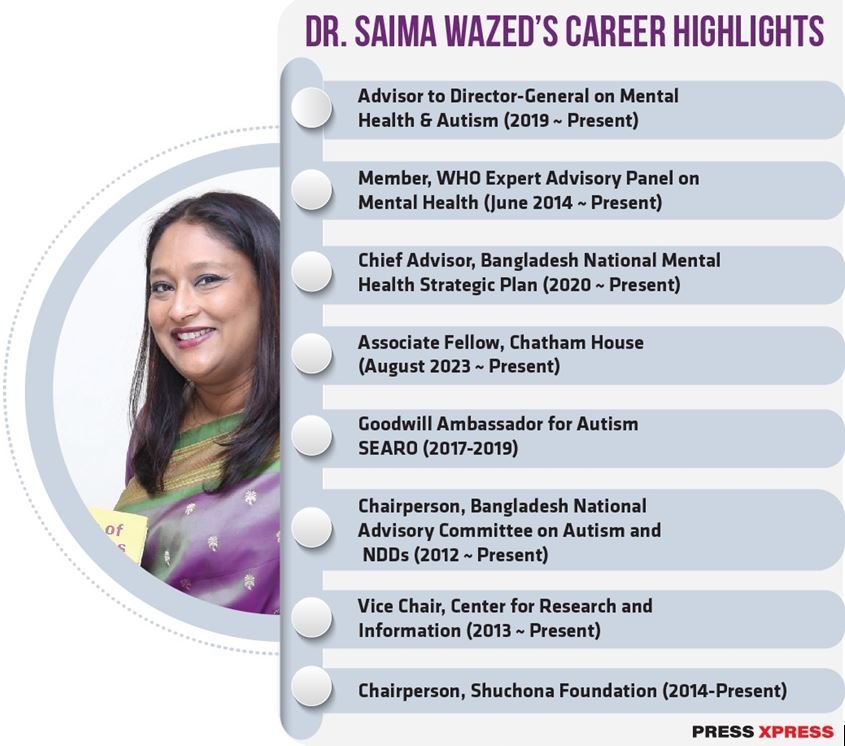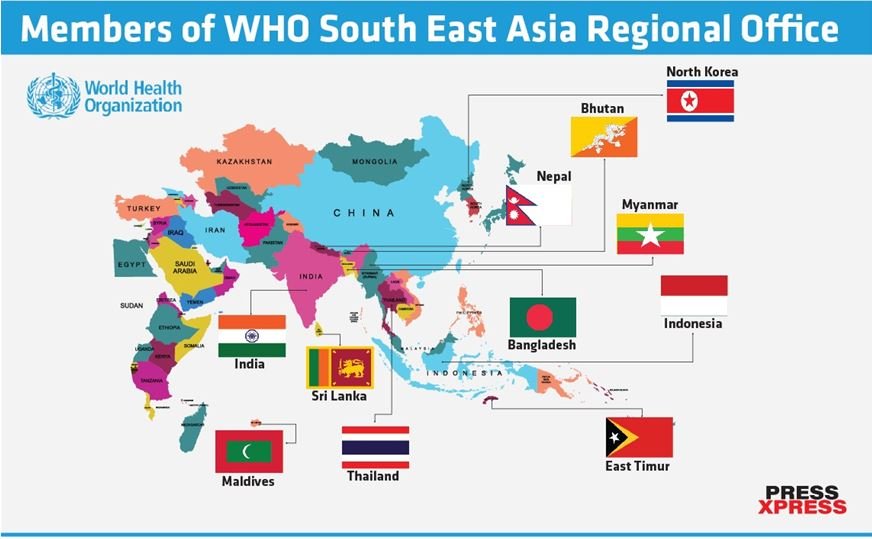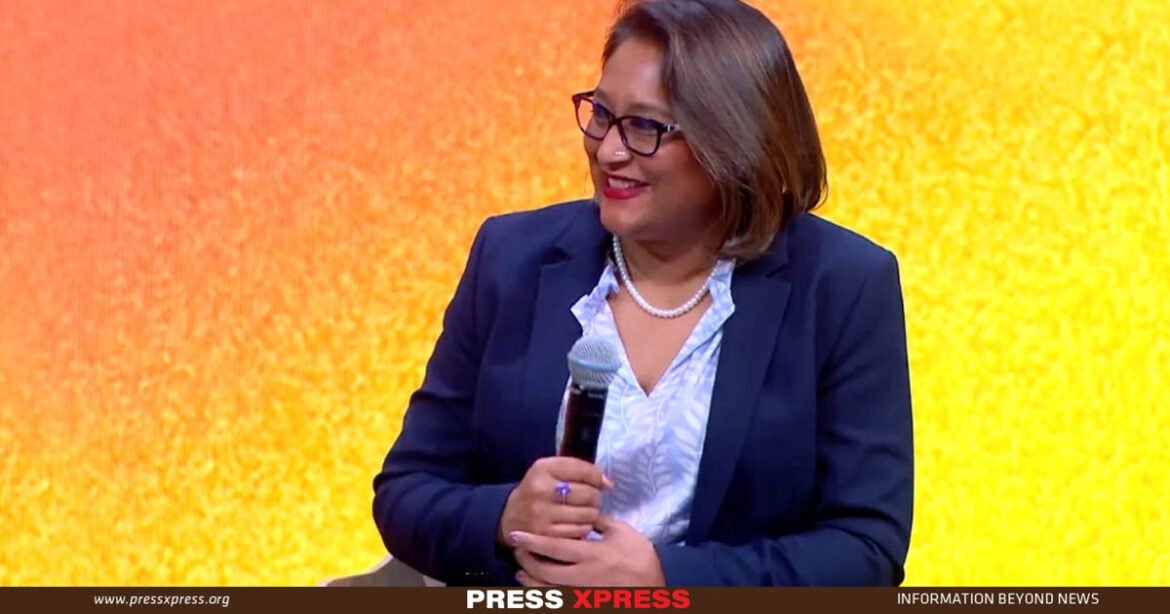Dr. Saima Wazed a prominent healthcare advocate has announced her candidacy for the role of Regional Director for World Health Organization’s South-East Asia Regional Office (WHOSEARO). Dr. Saima Wazed is the granddaughter of Father of the Nation Bangabandhu Sheikh Mujibur Rahman and daughter of Prime Minister Sheikh Hasina. She is known for her activism to raise awareness regarding Autism in Bangladesh and South Asia.
Recently, Saima Wazed, Chairperson of Shuchona Foundation received a special honorary doctorate degree for her contribution to autism. Former President M Abdul Hamid handed over the honorary degree to her at the fourth convocation of Bangabandhu Sheikh Mujib Medical University (BSMMU).
WHOSEARO is one of the six regional offices of World Health Organization which is composed of representatives of the Member States and Associate members in the region. On August 19th, Dr. Saima Wazed announced her candidacy via social media site X (formerly Twitter) for the Regional Director of SEARO.
Biography of Saima Wazed
Dr. Saima Wazed, born on December 9, 1972, is the daughter of Bangladesh’s current Prime Minister, Sheikh Hasina, and M. A. Wazed Miah, a nuclear scientist. She completed her education at Barry University, Miami and holds a license as a school psychologist. At present, she is a member of the World Health Organization’s Expert Advisory Panel on mental health.
You can also read: Saima Wazed receives honorary doctorate for Autism contribution
Notably, she organized the groundbreaking South Asian Conference on Autism in 2011, a pivotal event hosted in Dhaka, Bangladesh. Her visionary leadership extends to her role as the chairperson of the National Advisory Committee on Autism and Neurodevelopmental Disorders.
One of her significant achievements includes spearheading the resolution titled “Comprehensive and Coordinated Efforts for the Management of Autism Spectrum Disorders.” This resolution, presented at the esteemed World Health Assembly, garnered global support and recognition. Her relentless dedication to this cause earned accolades from Autism Speaks, an influential advocacy organization in the field.
Saima Wazed’s expertise also finds expression as a valued member of the World Health Organization’s Expert Advisory Panel on mental health. Her insights contribute to shaping impactful policies and strategies in this critical domain.
In November 2016, Saima Wazed assumed the esteemed position of chairperson for the UNESCO International Jury Board meeting, a platform dedicated to advancing the digital empowerment of individuals with disabilities. This role further underscores her commitment to inclusivity and accessibility.

Recognizing her profound impact, she was designated as the “WHO Champion for Autism” in the South-East Asia region in April 2017. This title reflects her unwavering commitment to advocating for effective solutions and support systems for individuals with autism.
A testament to her influence and credibility, Saima Wazed was appointed as the Goodwill Ambassador for Autism in the South-East Asia Region by the World Health Organization (WHO) in July 2017. Her advocacy extends beyond regional boundaries, contributing to a broader understanding of autism’s significance.
Continuing her influential journey, she became a distinguished member of the Commission for Universal Health in 2022. This commission, convened by Chatham House and co-chaired by notable figures such as Helen Clark and Jakaya Kikwete, focuses on advancing universal health initiatives on a global scale.
What is WHOSEARO?
The WHO South-East Asia Regional Office (WHO SEARO) stands as a pioneering force in advancing health and well-being across the South-East Asia region. As a specialized arm of the World Health Organization (WHO), SEARO plays a pivotal role in shaping healthcare policies, strategies, and initiatives that resonate on both local and global scales.
During the inaugural World Health Assembly in 1948, the inception of the South-East Asia Regional Office gained approval. Subsequently, in November of the same year, the establishment of the WHO Regional Office for South-East Asia took place in New Delhi. The founding members of this office included Afghanistan, India, Myanmar, Sri Lanka, and Thailand. Over time, the region has expanded its membership and now encompasses a total of 11 countries.

With its headquarters in New Delhi, India, WHO SEARO operates as a dynamic hub of collaboration, innovation, and expertise. Its core mission encompasses a wide spectrum of health challenges, from communicable diseases to non-communicable diseases, maternal and child health, and emergency preparedness.
Dr. Saima Wazed’s Vision for WHOSEARO?
Dr. Saima Wazed has published a detailed vision for the WHOSEARO on her website and also on her social media platforms. She envisions reinforcing the capabilities of Member States and WHO itself in addressing healthcare disparities within the context of present and unforeseen challenges. Her goal is to prevent marginalized groups from further disenfranchisement, focusing on empowering countries in the WHO South-East Asia Region (SEAR) to implement fair healthcare through innovative local solutions.
Dr. Saima Wazed aims to bolster areas where commendable progress has been made, including infectious diseases, maternal and child health, non-communicable diseases, mental health, health systems, emergencies, and universal health coverage. She plans to engage Member States in discussions about expanding flagship projects and recognizes the growing importance of mental health, given lessons from the pandemic.
Acknowledging that improving population health requires action beyond the healthcare sector, she aims to collaborate with education, economic, social, poverty alleviation, and regulatory sectors. Dr. Saima Wazed aims to unite marginalized groups under the umbrella of Universal Health Coverage, prioritizing strong health systems for equitable access.
Pandemic preparedness and climate change adaptation are crucial while harnessing technology’s potential, enhancing data systems, and sharing knowledge is integral to her strategy. She seeks constant guidance from countries to shape the Regional office’s direction in the ever-changing landscape.
With a quarter of the global population in the WHO South-East Asia Region, Dr. Saima Wazed acknowledges the diversity within and between countries. She emphasizes tailored solutions and aims to align regional priorities with WHO’s forthcoming General Programme of Work (GPW 14) in 2025. Dr. Saima Wazed’s vision revolves around holistic, inclusive, and innovative strategies for a healthier future in the SEARO.


